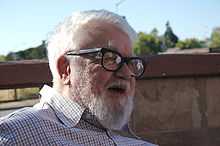John McCarthy

John McCarthy en 2006
Click on the following link to visit or download this HTML page
| Naissance |
Boston (États-Unis) |
|---|---|
| Décès |
(à 84 ans) Stanford (États-Unis) |
| Domicile |
|
| Nationalité | Américaine |
| Champs | Informatique |
| Institutions | Université Stanford, Massachusetts Institute of Technology, Dartmouth College, université de Princeton |
| Diplôme | Université de Princeton, California Institute of Technology |
| Renommé pour | Intelligence artificielle, LISP |
| Distinctions |
Prix Turing (1971) Prix Kyoto (1988) National Medal of Science (1991) Benjamin Franklin Medal (2003) |
John McCarthy (né le , à Boston, dans le Massachusetts - mort le [1]) est le principal pionnier de l'intelligence artificielle avec Marvin Lee Minsky ; il incarne le courant mettant l'accent sur la logique symbolique.
À la fin des années 1950, après un doctorat en mathématiques, il a créé avec Fernando Corbató la technique du temps partagé, qui permet à plusieurs utilisateurs d'employer simultanément un même ordinateur. Il est également le créateur du langage LISP, en 1958. Il reçoit le prix Turing en 1971 pour ses travaux en intelligence artificielle.
Adolescence et études
John McCarthy est né à Boston, dans le Massachusetts le d'un père immigrant Irlandais, John Patrick, et d'une mère juive lituanienne immigrante, Ida Glatt McCarthy[2]. Il a été contraint de voyager fréquemment, jusqu'à ce que son père trouve un travail à Los Angeles, en Californie.
McCarthy a dès son jeune âge montré un intérêt pour les mathématiques. Pendant son adolescence, il apprend les mathématiques en autodidacte, grâce aux livres de l'Institut technologique de Californie (Caltech). De fait, à son entrée à Caltech, ses connaissances lui permettent de passer les deux premières années de mathématiques[3].
Après l’obtention de son diplôme en 1948, McCarthy continue ses études à Caltech, pour finalement passer son doctorat de mathématiques à l'université de Princeton, en 1951.
À cette époque, McCarthy se marie à Vera Watson, une développeuse et alpiniste, morte en 1978 alors qu'elle tentait l’ascension de l'Annapurna I.
Carrière informatique
En 1956, il préside la conférence de Dartmouth, lors de laquelle il présente le principe d'élagage alpha-bêta, un algorithme d'évaluation jouant un rôle majeur dans la programmation en intelligence artificielle, notamment utilisé par la grande majorité des programmes d'échecs. Vers les années 1960, le programme Kotok-McCarthy, dont il est à l'origine, est l'un des plus performants. Il est également l'inventeur en 1958 du langage Lisp[1]. Il quitte le MIT en 1962 pour créer le laboratoire d'intelligence artificielle de l'université Stanford. À partir de 1962, McCarthy est professeur à l'université Stanford, jusqu'à ce qu'il prenne sa retraite en 2000. Il est aussi l'un des pionniers du cloud computing [4]. Il reçoit le prix Turing en 1971 pour ses travaux en intelligence artificielle.
Pendant sa retraite, il écrit une nouvelle de science-fiction, intitulée Le Robot et le bébé[5], « pour illustrer en partie ce que les robots domestiques devraient être »[6].
Récompenses
- Prix Turing de l’Association for Computing Machinery (1971).
- Prix Kyoto (1988).
- National Medal of Science (
 États-Unis) en mathématiques, statistiques et informatique (1991).
États-Unis) en mathématiques, statistiques et informatique (1991). - Membre du Musée de l'histoire de l'ordinateur (1999)
- Médaille Benjamin Franklin en informatique et sciences cognitives de la part du Franklin Institute (2003).
- Introduit à IEEE Intelligent Systems (2011), pour ses contributions dans la recherche sur l'intelligence artificielle et les systèmes intelligents[7],[8].
Publications majeures
- McCarthy, J. 1959. Programs with Common Sense. In Proceedings of the Teddington Conference on the Mechanization of Thought Processes, 756-91. London: Her Majesty's Stationery Office.
- McCarthy, J. 1960. Recursive functions of symbolic expressions and their computation by machine. Communications of the ACM 3(4):184-195.
- McCarthy, J. 1963a A basis for a mathematical theory of computation. In Computer Programming and formal systems. North-Holland.
- McCarthy, J. 1963b. Situations, actions, and causal laws. Technical report, université Stanford.
- McCarthy, J., and Hayes, P. J. 1969. Some philosophical problems from the standpoint of artificial intelligence. In Meltzer, B., and Michie, D., eds., Machine Intelligence 4. Édimbourg, Edinburgh University Press. 463-502.
- McCarthy, J. 1977. Epistemological problems of artificial intelligence. In IJCAI, 1038-1044.
- McCarthy, J. 1980. Circumscription: A form of non-monotonic reasoning. Artificial Intelligence 13(1-2):23-79.
- McCarthy, J. 1986. Applications of circumscription to common sense reasoning. Artificial Intelligence 28(1):89-116.
- McCarthy, J. 1990. Generality in artificial intelligence. In Lifschitz, V., ed., Formalizing Common Sense. Ablex. 226-236.
- McCarthy, J. 1993. Notes on formalizing context. In IJCAI, 555-562.
- McCarthy, J., and Buvac, S. 1997. Formalizing context: Expanded notes. In Aliseda, A.; van Glabbeek, R.; and Westerstahl, D., eds., Computing Natural Language. Université Stanford. Also available as Stanford Technical Note STAN-CS-TN-94-13.
- McCarthy, J. 1998. Elaboration tolerance. In Working Papers of the Fourth International Symposium on Logical formalizations of Commonsense Reasoning, Commonsense-1998.
- Costello, T., et McCarthy, J. 1999. Useful counterfactuals. Electronic Transactions on Artificial Intelligence 3(A):51-76
- McCarthy, J. 2002. Actions and other events in situation calculus. In Fensel, D.; Giunchiglia, F.; McGuinness, D.; et Williams, M., eds., Proceedings of KR-2002, 615-628.
Notes et références
- Spider & LISP, des amis pour la vie, Nicolas D.
- Last but not the least, My Spider in LISP, Nicolas D.
- 1 2 L'intelligence artificielle est orpheline; sur Slate.fr
- ↑ Out of Their Minds: The Lives and Discoveries of 15 Great Computer Scientists, Dennis Shasha et Cathy Lazere, printemps 1998.
- ↑ (en) Patrick J. Hayes, « On John McCarthy's 80th Birthday, in Honor of his Contributions », AI Magazine, Association for the Advancement of Artificial Intelligence, vol. 28, no 4,‎ , p. 93–102 (lire en ligne)
- ↑ « We keep inventing new names for time-sharing. It came to be called servers.… Now we call it cloud computing. That is still just time-sharing. John started it. »
- ↑ Le Robot et le bébé de John McCarthy
- ↑ John McCarthy, père de l'intelligence artificielle, est mort
- ↑ DOI:10.1109.2FMIS.2011.64
- ↑ (en) « IEEE Computer Society Magazine Honors Artificial Intelligence Leaders », DigitalJournal.com,‎ 24 août 2011 (lire en ligne) Press release source: PRWeb (Vocus).
Liens externes
- (en) Page professionnelle
- (en) Revue nécrologique du journal britannique The Daily Telegraph datant du mercredi 26 octobre 2011.
- (en) Publications de John McCarthy sur DBLP
- (en) Publications de John McCarthy sur ScientificCommons
- Notices d’autorité : Fichier d’autorité international virtuel • International Standard Name Identifier • Bibliothèque nationale de France • Bibliothèque du Congrès • Gemeinsame Normdatei • Bibliothèque nationale de la Diète • WorldCat
- Portail de l'informatique théorique
- Portail de la programmation informatique
- Portail des États-Unis
